Gone are the days when people used to rely on chatbots to get scripted responses to handle simple queries. Since the era of 2025, conversational AI platform has been introduced to offer dynamic and personalized interactions. Hence, if you are looking for the best virtual assistant platforms, we have you covered. In this article, we have mentioned 10 foremost conversational AI platforms, letting you pick the preferred one.
What is a Conversational AI Platform?
Based on the natural language processing model, the conversational AI platform is a type of artificial intelligence that simulates human interaction. Using this benchmark and machine learning system, it understands the context and interacts with the user in a human tone. Moreover, these platforms can be used for numerous purposes like customer service, making recommendations, and automating processes.
Since chatbots only follow the pre-set scripts, an ideal NLP system is more intelligent and flexible. Besides interactions, they learn from the previous chats and adapt to context-based responses. Therefore, with this facility, organizations can boost customer experience, improve efficiency, and reduce human effort.
Why Businesses Leverage Conversational AI Platforms?
Businesses leverage conversational AI platforms to improve customer engagement, streamline operations, and enhance user experience. By utilizing AI-powered chatbots, virtual assistants, and voice assistants, companies can provide 24/7 customer support, automate repetitive tasks, and scale their services without additional manpower. These platforms allow businesses to offer personalized and efficient interactions, which ultimately lead to higher customer satisfaction, reduced operational costs, and increased productivity. Additionally, conversational AI platforms often come with analytics and reporting tools, helping businesses gain valuable insights into customer behavior and preferences.
How Does a Conversational AI Platform Work?
Conversational AI software uses innovative technology like natural language processing and machine learning to interpret the user’s input. To do that, it begins by analyzing the text or voice command to determine the content of the conversion. Hence, once the intended intent is identified, the system retrieves the relevant information and generates a human-like response.
During that, it makes use of the natural language generation model to offer meaningful interactions. Furthermore, as the user and AI interact, the platform improves through machine learning and analysis of past conversions for better accuracy. Thus, due to this ability, it adapts to the user’s preferences and handles intricate queries to make communication smart and natural.
How to Choose a Conversational AI Platform for Your Business?
Seeking dependable conversational AI companies is not as simple as it seems, as there are a lot of factors one needs to consider. Henceforth, in this section, we have mentioned 5 main features that you need to look for.
- Natural Language Processing Capabilities: Ensure the platform features NLP facilities to easily comprehend intricate details. Having this feature will ensure that users have accurate and natural conversations with AI.
- Integration with APIs and Systems: Additionally, guarantee that the preferred solution has the ability to integrate with existing systems like CRMs or ERPs through APIs. Through this, you cannot just offer compelling features but ensure seamless data exchange and automation.
- Customizability and Development Options: Seek a platform just like ZEGOCLOUD that allows customization of workflow and user interaction. Hence, once ensured, users can meet various business needs by providing advanced and tailored features.
- Data Security and Compliance: Besides features, determine whether the conversational AI platform complies with GDPR or HIPAA regulations. By offering this facility, you can secure the user’s sensitive data and build trust-worthy customer support.
- Scalability and Performance: Lastly, verify that the platform you are considering can handle a bundle of customer queries without causing lag issues. Thus, with scalability, you can ensure seamless growth by managing peak times efficiently.
Conversational AI vs Chatbots
When looking for free conversational AI for chatting online, many users confuse them with chatbots, thinking they are alike. However, there is a significant difference between them based on the models and features. Below, we have compiled a detailed table to clarify the distinction between chatbot and conversational AI.
| Feature | Conversational AI | Chatbots |
|---|---|---|
| Technology | Uses advanced AI, machine learning, and natural language processing (NLP). | Primarily rule-based, often using scripted responses. |
| Complexity | Can handle complex, multi-turn conversations with context. | Manages simple, single-turn queries with limited context. |
| Learning Ability | Learns and improves over time through interactions. | No learning capability; relies on pre-programmed responses. |
| Understanding of Context | Comprehends context, intent, and emotions, providing dynamic responses. | Limited understanding of context; responses are fixed. |
| Response Generation | Generates responses based on user input, context, and past interactions. | Replies are pre-determined and follow specific keywords or commands. |
| Personalization | Can adapt and offer personalized experiences based on user data. | Offers limited or no personalization. |
| Multitasking | Handle multiple tasks and understand a range of topics. | Typically designed for one task or specific area. |
| Use Cases | Customer service, virtual assistants, data analysis, marketing, e-commerce, etc. | Basic customer support, FAQs, booking systems, etc. |
| Response Accuracy | High accuracy with contextual understanding and continuous improvement. | Limited accuracy, especially with vague or complex queries. |
10 Best Conversational AI Platforms for 2025
Choosing an ideal conversational AI solution is hectic and time-consuming as one has to bear several factors in mind. Hence, we have gathered the 10 best options with comprehensive details to make hunting more effortless.
1. Boost.ai
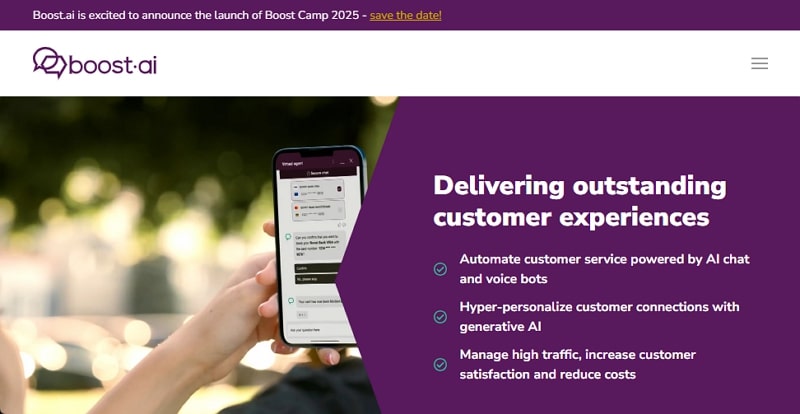
Being a secure and scalable conversational AI platform, Boost.ai supports cloud-based and on-premise solutions for various organizations. Since it is GenAI-empowered, it has natural language algorithms for internet queries. After analyzing the context, the centralized information repository feature efficiently manages the data. Furthermore, leveraging an authentication management facility, this platform ensures authorized access to sensitive information.
Key Features
- Being omnichannel, it connects customers across different platforms like apps, websites, and stores.
- This AI-powered solution also allows users to interact with AI via messages and voice calls.
- Besides that, it supports a non-code interface to create user-friendly chatbots.
2. Yellow.ai
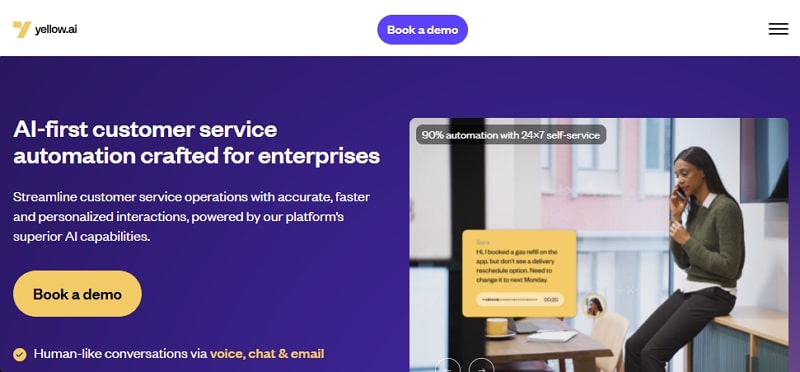
If offering fast and lag-free service is your goal, Yellow.ai ensures you fast customer service operation through in-house LLMs. In addition, this conversational AI software offers AI agents that can seamlessly communicate in over 135 global and regional languages. Regardless of the language one opts for, the AI analyses human emotions and responds correspondingly.
Key Features
- Its AI agents support tone-changer features to adjust the conversion style for an adaptable interaction experience.
- Using its intuitive interface, one can also create customized AI agents for specific needs.
- Unlike other platforms, users can interact with AI through voice calls, chat, and emails, ensuring seamless interaction.
3. Rezolve.ai
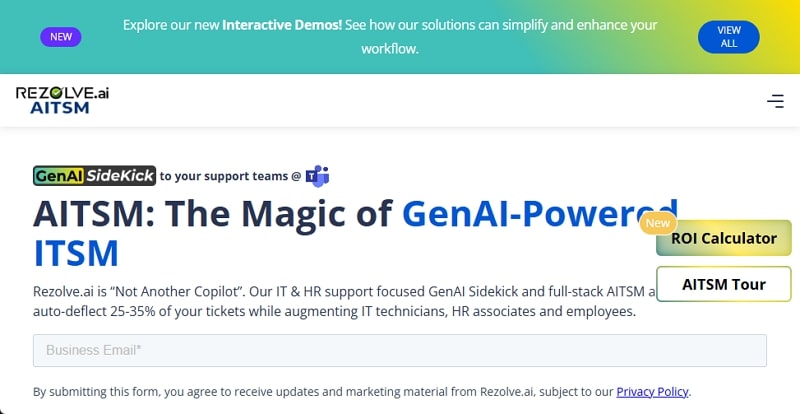
Designed for employees, this conversational AI tool provides an AI-powered knowledge base to let users access key information. Since it uses a retrieve and generate algorithm, it first retrieves the relevant data from the database and then generates a response. Moreover, the best aspect is that the knowledge base is up-to-date, so employees get accurate and relevant information.
Key Features
- This solution’s AI tool adapts according to the user’s needs by learning from past interactions.
- Besides, using an integrated live chat feature, it offers real-time suggestions to streamline the workflow.
- With pre-built integration, Rezolve.ai can easily connect with various applications without raising compatibility concerns.
4. Leena.ai
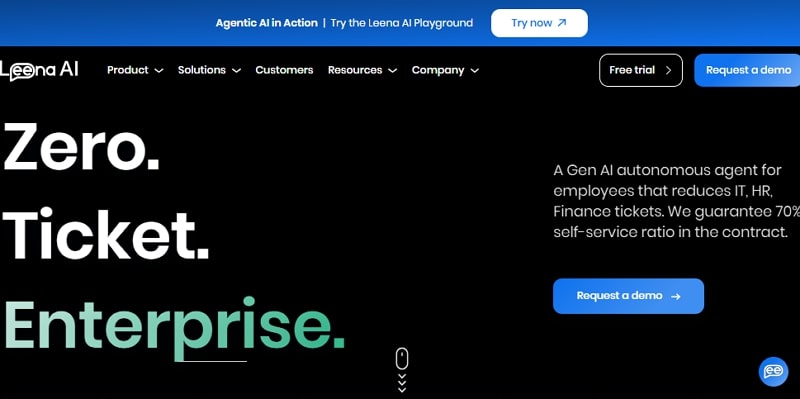
Having the ability of over 1000 integrations with enterprise apps, Leena.ai is another foremost solution for you. This conversational AI platform’s AI easily identifies the knowledge gap and proactively creates suggestions to ensure informed interactions. Moreover, it supports an extensive knowledge base to provide relevant and updated recommendations for user’s queries.
Key Features
- This platform ensures that the user’s data won’t be used to train models when accessing tailored suggestions.
- Additionally, to prevent any legal issues, it complies with the EU AI Act while meeting regulatory standards.
- To offer collaboration globally, Leena.ai features 100 languages to offer seamless communication and support for diverse teams.
5. Haptik.ai

Using this conversational AI solution, you can integrate Gen AI into a marketing platform if your goal is to improve customer satisfaction and ROI. Using this platform, you can create an AI agent for Q&A to support content and offer fast assistance. In addition, its WhatsApp Business API allows users to resolve queries while reducing acquisition costs.
Key Features
- By integrating Gen AI sales assistant, you can also provide buying guidance to the users.
- This conversational AI platform supports more than 100 languages and lets businesses target buyers globally.
- Using its enterprise-grade security, Haptik.ai guarantees the security of PII data and sensitive information.
6. Moveworks
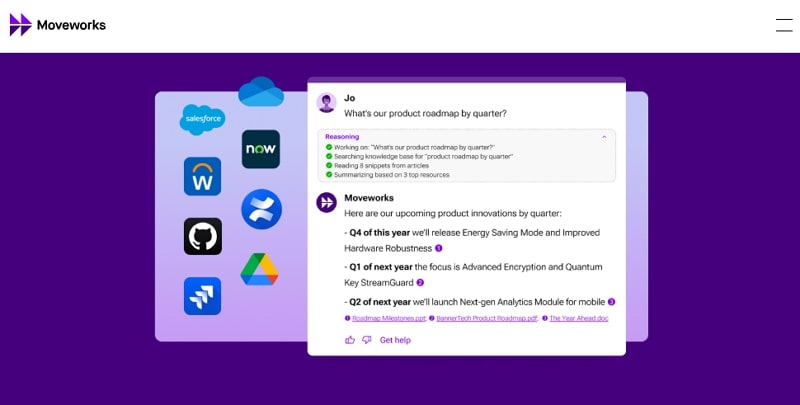
Moveworks is another of the finest conversational AI tools that uses a reasoning-powered approach to search and discover information. Besides just prompts, its AI has the capability to locate files and format locations to streamline tasks. Plus, this platform eliminates the effort of tech stack bloat and tool travel by creating generative AI functionalities in one virtual assistant.
Key Features
- Reputable companies like Toyota and GitHub mainly use this tool to boost customer service because of its fast response delivery facility.
- For assistance, it also supports a text message facility to receive real-time updates.
- Its AI agent can easily automate software provisioning and troubleshoot IT issues, eliminating human effort.
7. Amazon Lex
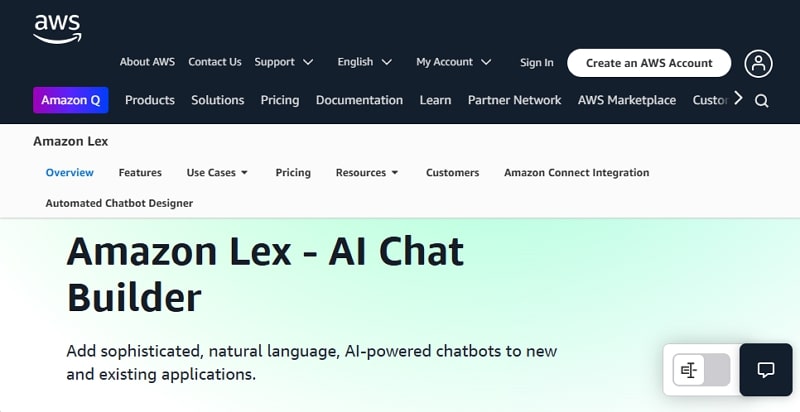
Even though it’s not a free conversational AI for chatting online, it allows you to create AI agents with sophisticated natural language processing abilities. Hence, using its NLM model, users can make voice and AI chatbots in applications to get virtual assistance. Other than that, one can also offer a streaming chat facility to users so that they can start and pause multi-turn conversations.
Key Features
- Using this platform, one can deploy chatbots in chat services like Messenger, Slack, Kik, and even mobile phones.
- Users can also interact with the AI chatbots via text and voice messages to get instant solutions for queries.
- Through a visual conversation builder, Amazon Lex allows designers to design bots according to their preferences.
8. Cognigy.AI
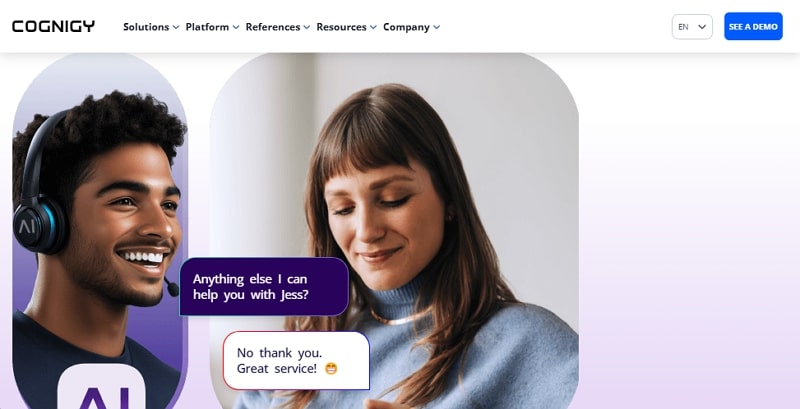
Among many conversational AI companies, Cognigy.AI is standing out because of its Agent Copilot. Using this, organizations can give customers a seamless and consistent experience with automated call wrap-ups. Additionally, Copilot retrieves relevant CRM data and provides actionable insights to offer personalized solutions.
Key Features
- Besides Copilot, its AI agents allow users to share prompts through messages to deliver quick responses using NLP models.
- Since it is omnipresent, its AI assistant can be accessed on more than 30 channels via standard interfaces.
- Using IVR solutions, consumers can communicate with AI through calls, after which it gathers data and delivers accurate responses.
9. Aisera
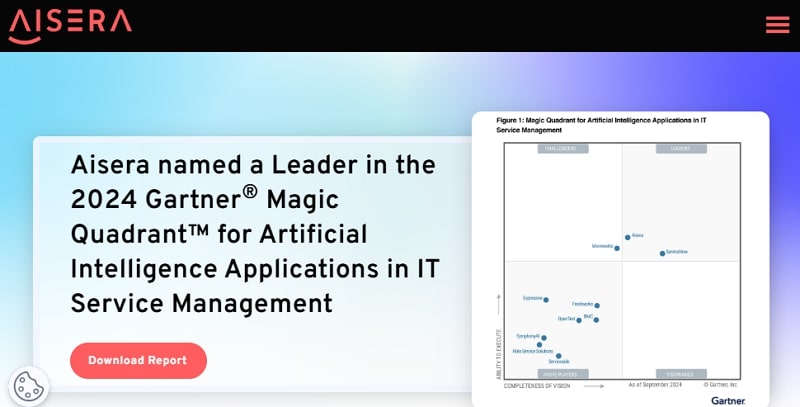
Whether you use this conversational AI software for HR, IT, or marketing purposes, it offers a unified interface for interacting with AI. Furthermore, using domain-specific LLMs, the AI agents reduce the hallucinations and ensure information accuracy. Instead of having a machine tone, it supports a natural and intuitive conversational experience to offer an empathic feel to users.
Key Features
- Its virtual assistance can proactively predict incidents like revenue loss and instantly resolve them.
- This platform also allows organizations to use their own ITSM data or use Aisera’s proprietary LLM.
- To ask for recommendations, users will be offered a chat facility to share insights with AI seamlessly.
10. Amelia
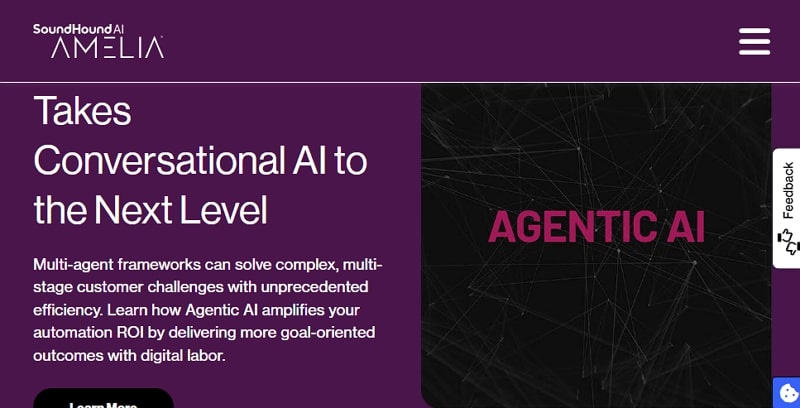
Offering 3 types of AI agents, including Answer, Action, and Autonomous, Amelia is a versatile conversational AI platform. Through Answer agents, customers can get instant replies as the AI uses companies’ knowledge base to retrieve data. On the contrary, action agents are designed to reduce the pressure on the contact and support team. Integrating with enterprise systems, it offers end-to-end resolutions for employees and customers.
Key Features
- Its autonomous agent is a combination of prior AIs with AI research abilities to scale AI just by giving instructions.
- To ensure security for the organization, this platform follows ISO, HIPAA, and GRPR regulations.
- Making this platform globally accessible, it supports over 100 languages to offer exceptional services.
How ZEGOCLOUD Enhances Conversational AI Platforms for Seamless Real-Time Interactions?
From the list of reputable conversational AI companies, ZEGOCLOUD offers easy-to-integrate AI agents API to improve customer service. Considering this API, you can provide a virtual assistant that features LLM and TTS models, human-like communication, and automation. Moreover, developers can choose TTS vendors to match agent’s tone with their roles. Plus, it will offer a voice detection VAD feature that lets users and AI communicate without having unnecessary surrounding noises.
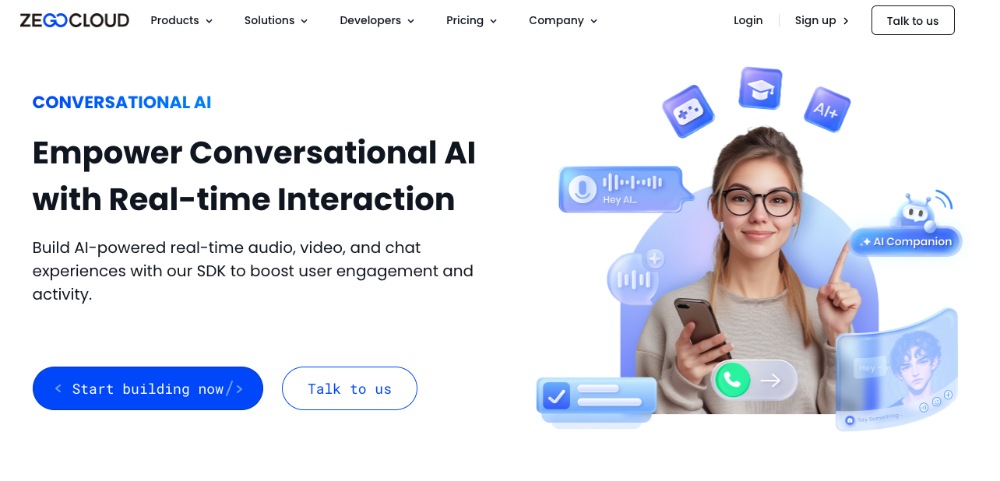
Furthermore, for organizations with crowded server issues, ZEGOCLOUD AI agent API ensures global coverage with over 500 nodes in 212 countries. The fascinating aspect of this platform is that it lets you personalize your virtual assistance by offering an AI agent template feature. Hence, you can generate characters based on the system prompt using multimodal plugin management. Through this, organizations can either add Speech-to-Text (ASR) or Text-to-Speech (TTS) plugins for interaction.
Regarding communication, this API offers you an in-app chat and voice interaction facility. While using the chat feature, you can edit the AI replies and clear session history for privacy. However, during voice interaction, the SDK offers the facility to display the user text and AI voice after the conversion ends. Unlike other platforms, you can change the mode of communication from text to voice chat while sharing context.
Conclusion
Summing up, the demand for conversational AI platforms is increasing day by day as they can automate tasks and offer quick recommendations via AI agents. Hence, whether you are a developer or organization holder seeking the best solutions in 2025, we have sorted you.
Here, we have gathered the 10 best conversational AI solutions, allowing you to integrate AI agents seamlessly into your applications. However, we recommend using ZEGOCLOUD since this platform offers you an AI agent library to customize the virtual assistant. Not only that, but it also allows the direct transition from chat to voice calls, which conversational AI companies unusually lack.
Read more:
FAQ
Q1: What is the best conversational AI platform?
The best conversational AI platform depends on your use case. For general-purpose conversations, ChatGPT by OpenAI is highly popular. For enterprise solutions, platforms like Google Dialogflow, Microsoft Bot Framework, and IBM Watson Assistant are widely used for their advanced customization options and integration capabilities.
Q2: Is ChatGPT a conversational AI?
Yes, ChatGPT is a conversational AI. It is designed to understand and respond to text-based inputs in a human-like manner, making it suitable for answering questions, assisting with tasks, and even casual conversations.
Q3: Which AI tool is best for conversation?
For everyday conversations, tools like ChatGPT and Replika are popular. For business and customer service, platforms such as Google Dialogflow, Zendesk Answer Bot, and IBM Watson Assistant are considered top choices. The best tool depends on whether you need it for personal use or enterprise applications.
Let’s Build APP Together
Start building with real-time video, voice & chat SDK for apps today!










